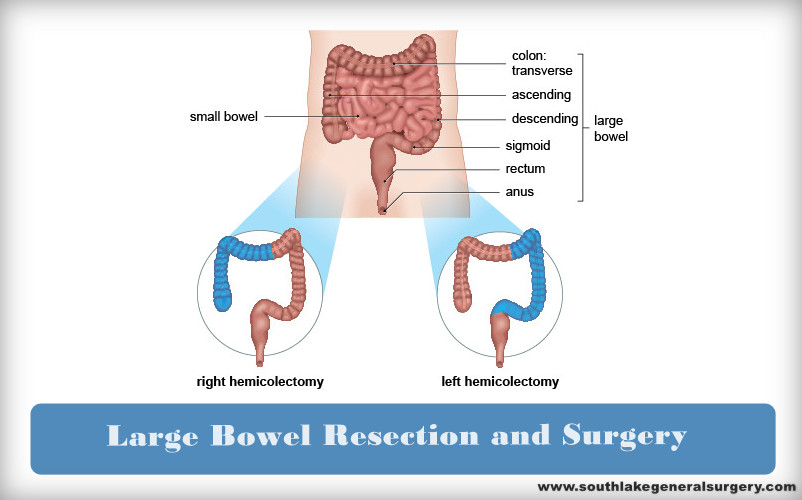A large bowel resection is also called a colectomy. The objective of this surgical procedure is to eliminate ailing segments of your large bowel. The large bowel resection is also called the large intestine or the colon.
During this surgical procedure, the surgeon eliminates the ailing portion of the bowel and then reconnects the healthy portion of the bowel. The surgeon may eliminate all or part of the bowel.
A colostomy is performed if there’s insufficient healthy intestine after surgery. During a colostomy, the surgeon moves one end of the large intestine to the outside of the stomach wall and connects a colostomy bag to the abdomen. Once stool goes through to the large intestine, it channels into the pack. The stool that goes into the sack is normally delicate or fluid.
A colostomy is regularly transitory and requires a highly experienced laparoscopic surgeon to perform the surgery. You’ll have the bag until the intestine recuperates. During another surgery, the surgeon would then be able to eliminate the colostomy. In a few cases, the colostomy is permanent.
What is the need for a large bowel resection?
A large bowel resection might be important to treat conditions, for example,
- intestinal blockages happen due to scar tissue or tumors
- diverticulitis refers to an illness of the large bowel
- volvulus refers to an unusual contorting of the bowel
- intussusception happens when one portion of the intestine slides into another portion of the intestine
- precancerous polyps
- colon cancer
- infection
- intestinal bleeding
- ulcerative colitis refers to a type of bowel inflammation
Risk of Large bowel resection
A wide range of surgical procedures carries some risks. These risks may include:
- infection
- heart attack or stroke
- breathing problem
- bleeding
- blood clots
- pneumonia
- damage to adjacent structures
The risks that are explicit for a lower bowel resection include:
- internal abdominal bleeding
- an incisional hernia, which happens when the tissue gets through the surgical incision
- damage to the bladder or other close by organs
- scar tissue
- dehiscence refers to an opening of a surgical wound
- problems with the colostomy, such as skin irritation
There is likewise a risk related to general anesthesia. These incorporate responses to medicine and breathing challenges.
What do I do to prepare for a large bowel resection?
At any rate, two weeks prior to surgery, inform your PCP regarding all the medicines you’re taking. You ought to incorporate supplements, for example, vitamins and herbs. It is necessary to inform them about any recent sicknesses including any colds, sicknesses, or herpes breakouts.
Prior to surgery, the doctor may require you to:
- avoid consuming blood-thinning medicines, like aspirin, ibuprofen, naproxen, or warfarin
- increase water intake
- take high-fiber meals
- quit smoking
A couple of days prior you have a large bowel resection; you may have to:
- take laxatives to assist you with defecating
- go for an enema to clear the colon
- drink only clear fluids, like water, fresh juice, and broth
Upon the arrival of surgery, adhere to your PCP’s guidelines. You may have to avoid eating or drinking anything for 12 hours before the surgical procedure.
Procedure for a large bowel resection
You’ll get general anesthesia prior to the surgery. This will keep you asleep during the surgical procedure. It will likewise shield you from feeling pain. The surgeon may perform a laparoscopic colectomy or open colectomy.
In a laparoscopic colectomy at Southlake General Surgery, Texas, our surgeon uses a camera to get an exact view of the intestines on the monitor. The surgical procedure is performed through a series of small cuts. It’s less invasive as compared to open colectomy surgery.
In an open colectomy, our surgeon makes a large cut in the abdomen to view the bowel.
The fundamental structure of the two surgical procedures is equivalent. The surgeon gets to your bowel using at least one cut and eliminates the infected or damaged bowel. The leftover bowel is stapled or sewn together. This is called anastomosis. Our surgeon will likewise perform a colostomy if necessary. They’ll suture the surgical cut closed at that point.
In a few circumstances, the surgeon may also have to eliminate other organs during the medical procedure.
After a large bowel resection surgery
You might have to stay in the hospital for three to seven days. You may have to remain in the hospital longer if there are complications after surgery.
You’ll need to adhere to explicit guidelines about how to eat after surgery. You’re, by and large, ready to drink clear fluids on the second or third day. As you heal, you’ll have the option to drink thicker liquids and eat soft meals.
A complete recovery may take up to two months.
Takeaway
Many people who have had a large bowel resection recover fully. You may need to use a colostomy sack temporarily. You may likewise require a permanent colostomy. A colostomy doesn’t typically keep you from doing the exercises you like to do.
You may require continuous medical care if you have a persistent and chronic bowel condition, for example, cancer, Crohn’s disease, or ulcerative colitis.
Appointment
For more information on “Large Bowel Resection Surgery and Recovery” or a consultation with Dr. Valeria Simone MD, at Southlake General Surgery, Texas, USA. Our healthcare expert will help you answer all your questions. We are just a call away: +1 817-748-0200.

